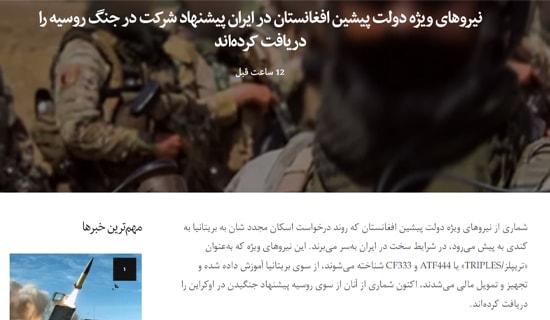Is today the day? Tomorrow? After the Beijing Winter Olympics? Or after the 20th Party Congress in October 2022? Perhaps, the timeline is extended to 2049, the centennial anniversary of the Chinese Communist Party's ascent to power in Beijing. More and more, the region and the world speculate when the Chinese military incursions into and around Taiwan air, sea, and cyber domains will transition from the gray zone to the black and white of kinetic offensive strikes.

PLA troops practice amphibious landing. (source: PLA Eastern Theater Command, Taiwannews.com.tw/en/news/4151070, March 15, 2021).
Recently, heightened tensions in the Taiwan Strait have figured prominently in mainstream reporting perhaps more than any time since the missile crisis of 1996 during which the Chinese lobbed missiles into waters adjacent to Taiwan. General-Secretary Xi Jinping's relatively conciliatory comments commemorating the Wuchang Uprising and the subsequent fall of the Qing Dynasty regarding Taiwan "returning to the motherland" stand in stark contrast to the unbridled hard-power of People's Liberation Army (PLA) aggression that has grown to unprecedented levels short of the artillery barrages of the 1950s and 1960s of Taiwan's off-shore islands. The scope and scale of PLA intrusions into Taiwan's Air Defense Identification Zone (ADIZ) is meant not only to message Taiwan and the U.S., but also any other country that could potentially be inclined to support the democratic autonomy of the people of Taiwan. Conflict in the Taiwan Strait would impact every country in the region, and beyond. This makes the potential costs of miscalculation so prohibitive, yet still not impossible to envision. Alarmingly, risks for miscalculation emanate from all three relevant capitals - Beijing, Taipei, and Washington, D.C.
Beijing
The ruling elite of the People's Republic of China (PRC) has become more strident in its calls for Taiwan's eventual return to Beijing control. Deng Xiaoping's historic 24-character maxim that exulted "hide our capacities and bide our time" has clearly been jettisoned by the current leadership. General-Secretary Xi has repeatedly stated that it's not a question of if, but when Taiwan is absorbed into mainland China. In his October 9 speech in the Great Hall of the People, he said: "The historical task of the complete reunification of the motherland must be fulfilled, and will definitely be fulfilled." No one should ignore these statements of intent. When coupled with the PLA's growing capabilities and bellicose operational activities, it bodes ill for peaceful unification.
The capabilities of the PLA have undeniably grown in every domain since the Central Military Commission (CMC) watched rather powerlessly the deployment of two U.S. carrier strike groups in the vicinity of Taiwan in a show of force during the 1996 missile crisis. Massive increases in defense budgets, organizational reforms, more realistic training regimens, and growing overseas experience have undoubtedly increased PLA confidence to be able to successfully tame Taiwan. The potential that such self-assurance could lead to a precipitous decision for offensive action is only intensified by the presumption that PLA Generals and Admirals would be disinclined to tell their Chinese Communist Party (CCP) masters that their newly developed power still has limits despite a triple-digit percentage increase in the defense budget over the past two decades.
Sustained Chinese defense investment has arguably shifted the military balance in the Taiwan Strait in its favor. This emboldens Chinese leaders to unilaterally change the status quo of Taiwan political autonomy. This is furthered reinforced by Beijing's long-standing narrative of inevitable U.S. decline, integral to their global strategic communications following the financial crisis of 2008. This narrative is not really new. In the 1950s and 1960s, Mao's China consistently referred to the U.S. as a Paper Tiger relying on nuclear deterrence. More recently in the 1990s, Chinese commentators referred to Somalia Syndrome in the wake of the "Blackhawk down" moment in Mogadishu and the subsequent withdrawal. And then there is the even more recent Chinese mocking of the U.S. debacle in Afghanistan and warnings to American allies that the U.S. cannot be counted upon. While not necessarily wrong, the peril of CCP leaders drinking their own Kool-Aid by misreading Washington and the American people carries great risk.

President Xi Inspects PLA units in Hong Kong, June 2017 (source: Chinaplus.cri.cn/, Chinaplus.cri.cn/news/china/9/20170630/7463.html, accessed October 28, 2021)
Despite Chinese propaganda pronouncements, Taiwan is not Afghanistan. Bi-partisan support for Taiwan in the U.S. Congress is atypically broad and deep. Taiwan's role as a model democracy and its pivotal leadership in the semi-conductor industry resonate with a multitude of sectors in the U.S. Moreover, the Taiwan Relations Act (TRA), while not providing the strategic clarity many seek today, certainly portends that the U.S. would not remain a casual observer to naked Chinese aggression. Xi Jinping's purges of any opposition, or even potential opposition, to his power has eliminated any diversity of thought with the Politburo Standing Committee and the CMC which risks that this unanimity may lead to miscalculations that no one in the Zhongnanhai leadership compound will dare to question.
Taipei
Possible Taiwanese miscalculation has its own distinct characteristics based on wide-ranging presumptions that range from "the Chinese will never attack" to "the U.S. cavalry will come to the rescue if they do." Ironically, this is heavily influenced by both a dangerous misinterpretation of PRC intent and an overly optimistic interpretation of U.S. policy.
China's saber rattling, while increasing in scope and scale, is nothing new. The PLA's almost constant drumbeat of pressure has somewhat desensitized the people of Taiwan. Despite Taiwan Defense Minister, and former General, Chiu Kuo-cheng's statement that the cross-Strait situation was "the most serious" in more than 40 years, much of the Taiwan Armed Forces' leadership doubts, based on dubious historical, cultural, and political assumptions, that the PLA will ever actually attack and essentially blames the U.S. for increased tensions.
Taiwan's previous Overall Defense Concept (ODC), a more effective and realistic approach of utilizing limited resources that has received widespread support from U.S. defense officials, has been abandoned by Taiwan's military leadership in the face of overwhelming evidence that such an asymmetric approach is exactly what is needed to deter, and if necessary, derail Chinese aggression. This perpetuates the view that Taiwan is not being truly serious about its own defense despite what many would deem to be an existential threat. International observers can only deduce that Taiwan military leaders have concluded that doing the hard things necessary to deter conflict are not necessary because they doubt the probability of that conflict ever actually occurring. That's a grave gamble.
Complacency on Taiwan may do more to embolden China than anything else. It is encouraging to note that polling data reveals that most residents now identify as Taiwanese rather than Chinese and the youth appears willing to defend their homeland. However, polls also convey an unwillingness to return to universal conscription, doubts about increased defense spending, and even that a plurality of the population plans to "leave the country," "unhappily accept the situation," "hide" or "choose to surrender" if there is war. In conjunction with deep concerns about misplaced Taiwan Ministry of National Defense procurement and organizational priorities, this fosters views and voices in the mainland that would argue that the risks in taking Taiwan are manageable.
Equally dangerous would be the notion that a Chinese reaction to a unilateral Taiwanese decision to change the status quo would result in anything short of offensive military action. Extreme factions on Taiwan's political spectrum advocating for a declaration of de jure independence are either dangerously naïve or dangerously gambling the future of their nation by what would have to be answered by Beijing with a use of overwhelming force.
While there should be no doubt in Beijing's response to such a negligent decision, the responses of the U.S. and other like-minded countries are not necessarily certain. The Taiwan Relations Act does not guarantee a U.S. military intervention particularly if China is needlessly and gratuitously provoked. Despite widespread political support for Taiwan and even recent polling data indicating a growing number of Americans would support intervention on behalf of Taiwan in case of conflict with China, Taiwan should not expect or plan for an automatic American military intervention. Moreover, it is almost a certainty that no other third country will enter the breach if the U.S. does not lead the way.
Washington, D.C.
The Biden Administration has largely kept intact the policies and principles focused on great power competition with China embodied in the previous administration's National Security Strategy of 2017 and National Defense Strategy of 2018. While they would never admit it publicly, President Biden's China hands in the Eisenhower Executive Office Building, the Pentagon, and at Foggy Bottom will continue the prudent actions started in the Trump years to strengthen deterrence in the Taiwan Strait to ensure America's primacy in the Western Pacific.
While policy continuity in this regard should be viewed positively, there are worrisome issues that could fuel miscalculations on the U.S. side too. Friction in the public comments of senior U.S. military leaders is disconcerting and destabilizing. The outgoing commander of the U.S. Indo-Pacific Command, Admiral Davidson, testified that China could take Taiwan by force by the end of this decade. General Milley, the Chairman of the Joint Chiefs of Staff, unconstructively extended the purported timeline into the more distant future. Such unhelpful dissonance sows doubt not only among U.S. stakeholders, but also amongst allies and partners, not to mention the Chinese.
While American steadfastness against Chinese revisionism is required, U.S. policy makers must be clear in their understanding and acknowledge that a CCP-controlled China will never give up its claim to Taiwan. Doing so would put into question CCP legitimacy and that is a risk that no Chinese leader will ever take. This realization does not mean that U.S. policy in support of the status quo of Taiwan autonomy should be altered. On the contrary, actions to militarily deter China through a variety of substantive means should be strengthened. This can be accomplished without unnecessarily agitating Beijing. No- and low-profile activities with the Taiwan Armed Forces will not necessarily compel a PLA response. They can effectively deter because the Chinese will eventually find out, but without eliciting counter-actions if done in a non-public manner. However, if we wantonly rub China's nose in our cooperation with Taiwan's military, then Beijing will have to respond in a way that assuages domestic jingoistic impulses. American defense planners and operational commanders as well as their policy masters must be lucid about that absolutism. While China is not a pluralistic democracy, even the CCP has constituencies that it must satisfy.
While some pundits have recommended unrestrained expansion of defense ties with Taiwan, few have examined the potential downside on Taiwan's own obligations of self-defense. Unconditional support of Taipei's misplaced defense priorities will ultimately be self-defeating. The U.S. must be strident in helping Taiwan, but tough love is warranted. As the only real guarantor of Taiwan autonomy, U.S. recommendations for arms acquisitions, doctrinal changes, and defense reforms should be heeded. Tacitly allowing Taiwan to continue investing limited resources into systems that would not survive the initial PLA onslaught while not making necessary structural and organizational changes actually calls into question real U.S. commitment to deterrence and invites miscalculation.
Now What?
Miscalculation is perhaps more probable than a conscious policy decision that leads to conflict. Ill-conceived comments by American diplomats led, in part, to aggression against Korea in 1950 and Kuwait in 1990. America's commitment to its allies, friends, and partners must be clear while not being unconditional.
In the case of Taiwan, U.S. clarity served with a side of ambiguity should be the order of the day. Specifically,
-
The Biden Administration's future National Security Strategy and National Defense Strategy must make it clear that the U.S. remains a Pacific power that will uphold its treaty obligations as well as domestic legislation such as the Taiwan Relations Act. It will not cede its regional leadership role to revisionist forces.
-
The U.S. will not accept any unilateral change in the status quo of Taiwan, whether originating in Beijing or Taipei.
-
The U.S. maintains a "One China policy" that has varying interpretations as well as several qualifiers and caveats, including the Six Assurances.
-
The U.S. will help those that help themselves. No partner or ally should expect Americans to expend blood or treasure to make up for negligence in providing for their own defense.
*Heino Klinck is a member of MEMRI's Board of Advisors. He served as the U.S. deputy assistant secretary of defense for East Asia, 2019-2021. As a U.S. Army foreign area officer, he served as a military attaché in China, 2004-2010





